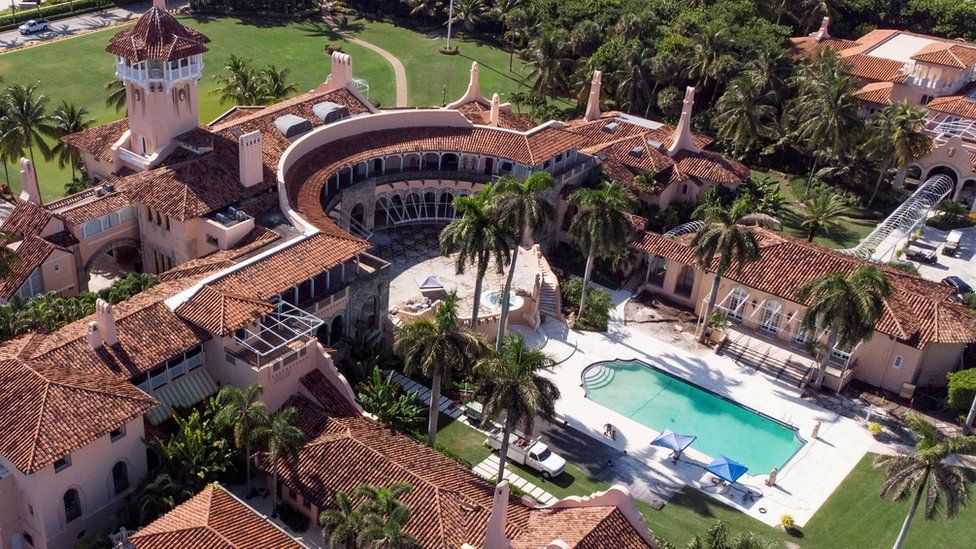Trump affidavit drops clues on scale of FBI investigation
27 August, 2022

The curtain of secrecy has been pulled back ever so slightly on the investigation into Donald Trump's handling of classified documents and presidential records at Mar-a-Lago. Even with all the redactions, the picture revealed should be concerning to the former president.
The public now has its first look at the court papers the US justice department used to obtain a search warrant for Mr Trump's Florida home. At least, part of it. And not the juiciest parts.
As expected, the document was heavily redacted by the justice department, with the approval of the judge who'd also signed off the unprecedented search by FBI agents on 8 August.
But the affidavit did provide an outline of the relevant laws in the case and described its work as "a criminal investigation concerning the improper removal and storage of classified information in unauthorised spaces, as well as the unlawful concealment or removal of government records". That last little tidbit was further expanded later in the affidavit, as the government wrote that it had reason to believe it would find evidence of obstruction of justice in its Mar-a-Lago search.
The affidavit also detailed the material kept at the seafront golf club that Mr Trump had already provided to the National Archives at the start of the year - albeit only after what the document described as repeated requests over more than six months.
Those boxes contained a random assortment of newspaper clippings, magazines and photos - but also 184 classified documents, including 25 marked "Top Secret", according to investigators.
The affidavit said that there was reasonable evidence to believe that there were more classified documents on the premises and that they were also stored in an unsecure location.
This may have been of particular concern to the government, given that there have already been instances where foreign nationals have gained access to Mar-a-Lago - with the most recent report being of a Ukrainian entering the estate in May 2021, meeting with associates of the former president and even posing for a golf-course photo with Mr Trump and South Carolina Senator Lindsey Graham.
This is a serious criminal investigation. It's not just about who gets to keep some presidential mementoes and souvenirs, it concerns the security of closely guarded US government secrets - ones involving human intelligence gathering, foreign surveillance and perhaps even court-authorised surveillance of US citizens.
There is still no indication, in the affidavit or elsewhere, as to why Mr Trump removed the allegedly sensitive documents from the White House and why he had been so reluctant to give them over to investigators when originally requested.
Why was so much of the document redacted?
About half of the 38-page document was redacted by the government, including entire pages in some cases. Some Republicans have pointed to this as evidence that the justice department is being insufficiently forthcoming and that there are uncomfortable details in the document it would prefer not to see the light of day.
In a separate filing, however, the justice department explained the reasoning behind its rescissions. Removed from the document was information about federal agents involved in the case and government witnesses who, if their identities were exposed, the justice department said could be subjected to "retaliation, intimidation or harassment, and even threats to their physical safety".
If current witnesses had their identities exposed, the government continued, it could discourage future individuals coming forward to share information relevant to the investigation.
Other redactions were made to prevent, in the government words, providing "a roadmap for anyone intent on obstructing the investigation".
The justice department wrote that it also was wary of revealing too much about the investigation for fear of giving out a "roadmap that could be used to obstruct the justice department's work".
For an affidavit like this to be unsealed, even in a heavily redacted form, is unusual. But this is not a usual case.
What happens next?
Now the justice department investigators will go back to work behind closed doors where they will continue to review the documents removed - working along with intelligence agencies to determine if national security has been compromised. Investigators also hinted about the possibility of reaching out to new witnesses.
We may not hear more in this case until a decision is made on whether to bring any criminal charges for mishandling of presidential records or classified material, or obstruction of justice.
The legal battles over the 8 August search of Mr Trump's Florida residence haven't quite concluded, however.
The former president's lawsuit requesting an independent "special master" review of the seized items is still pending, although the judge in that case has already expressed some scepticism about the request.
That lawsuit could lead to a pause in the investigation while a review is done to ensure no documents were seized that should be protected by attorney-client privilege.
And Mr Trump's public-relations campaign against the justice department and the investigation goes on. He's called it a "witch hunt" and has inflated the scope of his lawsuit, claiming that he was challenging the constitutionality of the search itself (he wasn't).
He has claimed that all this is an attempt to prevent him from continuing to engage in national politics, although as he's travelling the US to hold political rallies and continues to fan speculation of a future presidential bid, there is little evidence that he is at all deterred.
Source: www.bbc.com
